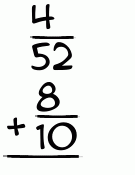What is 4/52 + 8/10?

|
Here's how we add
|
||||||||||||||||||||||||||||||||
Step 1Of course, you can't add two fractions if the denominators (bottom numbers) don't match. To get a common denominator, multiply the denominators together. Then we fix the numerators by multiplying each one by their other term's denominator. Now you multiply 4 by 10, and get 40, then we multiply 52 by 10 and get 520. Do the same for the second term. We multiply 8 by 52, and get 416, then multiply 52 by 10 and get 520. The problem now has new fractions to add:
|
||||||||||||||||||||||||||||||||
Step 2Since our denominators match, we can add the numerators. 40 + 416 = 456 This yields the answer
|
||||||||||||||||||||||||||||||||
Step 3The last step is to reduce the fraction if we can. To find out, we try dividing it by 2... Are both the numerator and the denominator evenly divisible by 2? Yes! So we reduce it:
So far so good... let's try to divide by that number again. Are both the numerator and the denominator evenly divisible by 2? Yes! So we reduce it:
So far so good... let's try to divide by that number again. Are both the numerator and the denominator evenly divisible by 2? Yes! So we reduce it:
So far so good... let's try to divide by that number again. No good. So next you try the next prime number, which is 3... No good. So next you try the next prime number, which is 5... No good. So next you try the next prime number, which is 7... No good. So next you try the next prime number, which is 11... No good. So next you try the next prime number, which is 13... No good. So next you try the next prime number, which is 17... No good. So next you try the next prime number, which is 19... No good. So next you try the next prime number, which is 23... No good. So next you try the next prime number, which is 29... No good. So next you try the next prime number, which is 31... No good. So next you try the next prime number, which is 37... No good. So next you try the next prime number, which is 41... No good. So next you try the next prime number, which is 43... No good. So next you try the next prime number, which is 47... No good. So next you try the next prime number, which is 53... No good. So next you try the next prime number, which is 59... No good. 59 is larger than 57. So we're done reducing. And we're done! Here's the final answer to 4/52 + 8/10
|